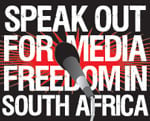
Top stories






More news
















As part of the anniversary, the MDDA, in partnership with the University of Free State (UFS) will be hosting a first UFS annual South African Press Freedom Day Seminar today, 19 October 2012. It is co-hosted by the Department of Communication Sciences and the Institute for the Studies of Race, Reconciliation and Social Justice.
The seminar themed "How Free Are Our Airwaves" will be held at the Chancellors Room, at the Bloemfontein Campus, from 8.30am to 2pm. Part of the discussions will include exploring the possibility of placing students at the community radio stations in the future and also encouraging the University's early childhood unit to design programmes for mothers of small children that will help brain development. This seminar is part of developing a close relationship between the universities and the stations.
In attendance will be media activists and practitioners, media and journalism university students, community media and small commercial media projects from the Free State province. The MDDA, in partnership with the Government Communication & Information System (GCIS), will capture the event activities through video and audio recordings. The recordings will be a contribution to building the sector knowledge management content and used as teaching material at the university on media studies and journalism.
The challenge facing our country in respect of the constitutional rights is to what extent these are enjoyed by all citizens. We reportedly need to reflect on the degree and lack of transformation of print media, and media diversity in our country. The Parliamentary Portfolio Committee on Communications in September 2011 and June 2012 reflected on transformational challenges and tasked the MDDA and GCIS to spearhead the process to consider a print media charter.
Print and Digital Media of South Africa (PDMSA) launched a transformational task team to look into this challenge and provide guidance. It is said that we need to assess and take stock of whether all citizens (poor and rich, rural or urban, etc.) have choice and access to information, freedom of expression, right to communication in languages of their choice.
At the Parliamentary discussions (Sept 2011 and June 2012), the PDMSA confirmed the essence of the MDDA report on Trends of Ownership and Control of Media in SA (July 2009), which indicated that the pace of transformation in the print media is too slow for a sector that is so critical in the sustainability of our democracy. PMSA reported that only an average of 14% of ownership of the mainstream print media is in black (historically disadvantaged) hands and women participation in board and senior management is limited to 4.44%.
This revelation, 18 years after the first democratic elections in 1994, suggest that all stakeholders honestly and dispassionately confront the question of media transformation and diversity in the interest of all citizens and sustainability of our democracy. The Press Freedom Commission (PFC) in its April 2012 report recommended considerations for content diversification, skills development and training, a media charter and support for community media.
A lot of work is needed and commitment to ensure the majority of South Africans enjoys these rights. We reportedly need greater access with a diversity of voices reflective of ethnic and racially diverse people, even though we have seen growth and renewed energy in the sector. It is therefore critical to appreciate the broader context, as we commemorate 19 October and celebrating media freedom, to emphasize the significant role media can play in helping people in all their diversity to communicate with each other in order to strengthen our democracy, promote a culture of human rights and enable all to participate fully in our economic growth and speed up transformation and development. Information is knowledge and power.
This can be achieved if every citizen irrespective of their social class, (where ever located, rural or urban, poor or rich) has access to a choice of a diverse range of media. We should remember that media freedom is for all citizens and not just for media practitioners. Media also provides a window of transparency in government and injects life to a country's economy by publishing financial and market information to citizens, allowing them to participate freely and fruitfully in their country's economy.
Access to communication and information empowers citizens, facilitates participatory democracy, and assists in defending, advancing and deepening our democracy. We must ensure that rural communities have access to all media including radio, television, online, mobile and print services. We must ensure responsible journalism and that our media is transformed to reflect South Africa in every respect. We must also support and create an enabling environment for media development and diversity.